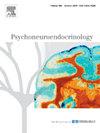The role of oxytocin in mediating the relationships between social factors and chemotherapy-associated cognitive decline in female patients with breast cancer
IF 3.4
2区 医学
Q2 ENDOCRINOLOGY & METABOLISM
引用次数: 0
Abstract
While chemotherapy can cause debilitating side effects, social support, particularly that of an intimate partner, can be protective. This study examined the relationships between couple satisfaction and chemotherapy-associated subjective and objective cognitive decline in a cohort of breast cancer patients, in addition to the roles of other social factors. Because of oxytocin’s role in social bonding and cognition, circulating oxytocin and oxytocin receptor gene expression in peripheral blood mononuclear cells were investigated as potential mediators. Partnered breast cancer patients (n = 48) completed cognitive assessments and provided blood samples at 3 timepoints: pre-chemotherapy, during chemotherapy, and post-chemotherapy. Participants completed a retrospective couple satisfaction questionnaire, provided information about partner duration as well as other social factors (e.g., number of people in the household, number of dependents under 18), and completed a retrospective perceived general social support questionnaire. Analyses were completed using linear mixed effects and regression models. More satisfaction in an intimate relationship related to both less subjective and objective cognitive decline over chemotherapy. Similarly, higher perceived social support related to less overall objective cognitive decline over chemotherapy, though this relationship was less robust than that observed with high couple satisfaction. Remarkably, circulating oxytocin decreased over chemotherapy but was only associated with partner duration and not with cognitive measures. This study suggests a potential benefit of social-directed interventions for the treatment of cognitive side effects of chemotherapy, either from an intimate partner or more generally. Furthermore, understanding biological mechanisms is important to develop novel preventative and interventional therapies to mitigate the adverse side effects of chemotherapy.
催产素在社会因素与女性乳腺癌患者化疗相关认知能力下降之间的中介作用
虽然化疗会产生使人衰弱的副作用,但社会支持,尤其是亲密伴侣的支持,可以起到保护作用。本研究考察了一组乳腺癌患者的夫妻满意度与化疗相关的主观和客观认知能力下降之间的关系,以及其他社会因素的作用。由于催产素在社会联系和认知中的作用,研究人员将循环催产素和外周血单核细胞中催产素受体基因的表达作为潜在的媒介进行了调查。有伴侣的乳腺癌患者(48 人)完成了认知评估,并在化疗前、化疗期间和化疗后三个时间点提供了血液样本。参与者填写了一份回顾性夫妇满意度问卷,提供了有关伴侣持续时间和其他社会因素(如家庭人口数、18 岁以下受抚养人数量)的信息,并填写了一份回顾性感知一般社会支持问卷。研究采用线性混合效应和回归模型进行分析。亲密关系中更多的满意度与化疗期间较少的主观和客观认知衰退有关。同样,感知到的社会支持越高,化疗期间客观认知能力下降的程度就越低,但这种关系不如夫妻满意度高时的关系稳固。值得注意的是,循环催产素在化疗过程中会减少,但只与伴侣持续时间有关,而与认知指标无关。这项研究表明,以社交为导向的干预措施对治疗化疗的认知副作用有潜在的益处,无论是来自亲密伴侣的副作用还是更普遍的副作用。此外,了解生物机制对于开发新型预防和干预疗法以减轻化疗的不良副作用非常重要。
本文章由计算机程序翻译,如有差异,请以英文原文为准。
求助全文
约1分钟内获得全文
求助全文
来源期刊

Psychoneuroendocrinology
医学-精神病学
CiteScore
7.40
自引率
8.10%
发文量
268
审稿时长
66 days
期刊介绍:
Psychoneuroendocrinology publishes papers dealing with the interrelated disciplines of psychology, neurobiology, endocrinology, immunology, neurology, and psychiatry, with an emphasis on multidisciplinary studies aiming at integrating these disciplines in terms of either basic research or clinical implications. One of the main goals is to understand how a variety of psychobiological factors interact in the expression of the stress response as it relates to the development and/or maintenance of neuropsychiatric illnesses.
 求助内容:
求助内容: 应助结果提醒方式:
应助结果提醒方式:


